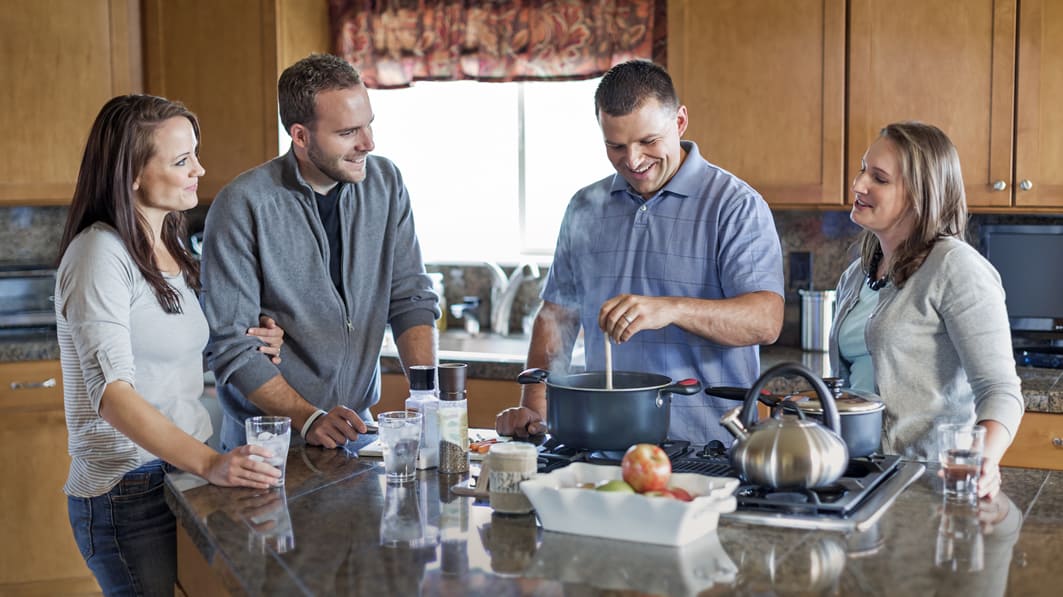Questions and Answers to help you find the perfect marriage mentors:
Q: What benefits does meeting with a premarital mentor offer to us?
Q: How do we find premarital marriage mentors?
Q: What should we look for in a premarital mentor couple?
Q: How should we approach a potential premarital mentor couple?
Q: How do we make the most of our time with our premarital mentors?
Q: How honest should we be with our premarital mentor couple?
Q: Are there topics that should be “off limits”?
Q: What are some of the common mistakes mentoree couples make?
Q: What if our premarital mentor couple is not a good “fit” or isn’t meeting our needs?
Q: What benefits does meeting with a premarital mentor offer to us?
A: Many! It is a place to be real, and to be encouraged. It’s an opportunity to discover things about your fiancé—and yourself. It’s a safe place to ask questions, wrestle with challenges and seek feedback. Your premarital mentor couple can serve as a model to aspire to, and a reminder that you and your fiancé can also lay a marital foundation that will weather the storms leading you to someday enjoy a thriving, successful, lifelong marriage. You’ll also receive objective, honest insights about your relationship from people who are committed to both you and your fiancé and want what’s best for you. We won’t try to tell you it will always be easy, but we will promise it will be worth it!
Back to Top
Q: How do we find premarital marriage mentors?
A: As you begin looking for a premarital mentor couple to walk through your engagement with you and into your first year of marriage, we’d encourage you to look around at the people already in your lives. Is there an experienced couple in your church, neighborhood, or other social circles that both you and your fiancé admire and would be comfortable meeting with? You might consider participating in a marriage-related Sunday school class or attending a premarital retreat, where you’ll meet other couples (who are one step ahead of you) who are committed to investing in not only their marriage, but possibly other’s marriages as well. Talk to your pastor to see if he might be able to recommend a couple. If you don’t currently attend a church, check with one or two in your area to see if they offer anything along these lines. All the while, be praying that God would lead you to the right pre-marriage mentors.
Q: What should we look for in a premarital mentor couple?
A: For starters, don’t go searching for the perfect couple … because you’ll never find them! Instead, look for a husband and wife that both you and your fiancé respect and whose marriage can serve as something of a model for you. Do they reflect character qualities like integrity, wisdom, trustworthiness, and honesty, as well as the “fruit of the Spirit” (Gal. 5:22-23)? Is their love for one another readily evident? Find a couple that is positive and encouraging, easy to talk to, that cares about you, is willing to invest in you, and has your best at heart. Shared interests (sports, music, outdoor activities, hobbies, etc.) are not necessarily essential, but they can be helpful in establishing a level of connection and comfort—especially for men.
Q: How should we approach a potential premarital mentor couple?
A: Once you’ve identified a potential couple, you might want to ask them out to lunch, have them over for dessert, or invite them to attend a fun activity or event with you and your fiancé. If you don’t know them well, this is a nonthreatening way to begin to build a friendship and to gauge whether a premarital mentoring relationship might be a good idea. If you and your fiancé decide they could be a good fit as mentors, then broach the subject. Tell them why you both have chosen to ask them, and explain your needs, expectations, and hopes. You might want to propose a small number of meetings to start–typically prior to starting your premarital education or counseling, as that allows both parties to “test the waters” without a steep commitment. If it seems to be working well, you can decide to continue throughout your engagement and into your first year of marriage and maybe even beyond!
After making your request, offer to allow them time to process and pray, then follow up a few days later. In most cases, the mentor couple will be honored to be asked and enthusiastic about starting a mentoring relationship with you and your fiancé. Don’t be discouraged, though, if the first couple you ask isn’t able to respond as you’d hoped. There is an experienced couple out there who would love to invest in your lives and your future marriage—so go find them!
Q: How do we make the most of our time with our premarital mentors?
A: First, talk in advance of each meeting with fiancé: What do you hope to accomplish with this meeting? What areas would you most like to grow in? What aspects of your future marriage are creating fears or concerns? Do either of you perceive areas that might be challenging? It might be helpful to jot down a few questions you want to ask or issues to address. Consider letting your mentor couple know ahead of time what you’d like to discuss so they can come better prepared. Or you may ask them if they would like to proceed through the Ready to Wed curriculum with you and your fiancé?
You’ll also want to be real with your mentor couple. Let them get to know both of you so they can understand how best to come alongside and encourage you and your fiancé. After each meeting, be sure to discuss with your fiancé what your “takeaways” were and what your next steps will be to continue growing and strengthening your future marriage.
Q: How honest should we be with our premarital mentor couple?
A: To get the most out of your premarital mentoring relationship, you’ll want to be fairly transparent. At the same time, always be honoring and supportive of your fiancé– even when addressing points of differing opinions or even disagreements with your future spouse. If you are planning to talk about sensitive issues, make sure you have your fiancé’s permission first. If an issue is particularly fresh or raw, you may still need time to process or address it with your fiancé before sharing it with your mentors. Many find it helpful to start a mentoring relationship by exploring lighter topics in the first meeting or two and then, as trust and comfort levels increase, delving into weightier issues. The important thing to remember, is that your premarital mentor couple desires to help you build a foundation of a healthy marriage–even if that means that they help you walk through some difficult conversations.
Q: How do I bring up delicate issues about our relationship with our premarital mentoring couple without hurting my fiancé?
A: You’re on the right track by asking the question. It’s important that both you and your fiancé check their hearts and motives before exploring potentially difficult areas. Sometimes you will bring up an issue hoping it will pressure their fiancé to change or become aware of something about them that you think they should change. Or they maybe you want to get the mentor couple on “your side.” Neither of these are healthy approaches. Rather, it’s important to see you and your fiancé as a team. Keep your own heart open (LINK TO GREG ARTICLE?) in the process. Freely admit your own faults, and be open to areas where you need to grow and change. That kind of mindset allows you to tackle tough topics in a way that works for the good of your future marriage relationship rather than placing blame and driving a wedge between you and your fiancé. Finally, keep in mind the Apostle Paul’s formula—“speaking the truth in love” (Eph. 4:15)—and you’ll seldom go wrong.
Q: Are there topics that should be “off limits”?
A Again, make sure you and your fiancé are on the same page here. If it is a particularly delicate subject, you may want to first ask your premarital mentors whether they are comfortable discussing it. In general, your premarital mentor couple is there to help walk you through whatever subject you’re dealing with in order to best prepare for marriage, but remember that they are not experts on every topic. You might want to give your premarital mentor couple a “heads up” about the issue prior to the meeting so they can do some thinking, research and preparation in advance. Keep in mind, too, that as you become aware of difficult family of origin issues or difficult relational issues, that often it may be best to seek the services of a professional counselor (see Q&A below).
Q: Is looking for a premarital marriage mentor a good idea if we are struggling with a serious issue (pornography, addiction, etc.)?
A: Yes, but first we’d urge you to seek the help of a licensed Christian counselor. Addictions, mental illness, and other serious personal or marital issues usually require the involvement of a trained professional. For an initial counseling consultation or to locate a counselor in your area, contact Focus on the Family at 1-800-A-FAMILY.
In addition to a counselor, you’ll also want to make sure you have a strong support system around you—and a premarital mentor couple can be a significant part of that. A mature, “safe” couple can serve as a wonderful outlet for support, encouragement, feedback and honest dialogue as you make progress in your counseling experience. Trusted confidantes like these can also help you overcome the shame, isolation and loneliness that often accompany such struggles, as you seek to understand what you are each bringing into your new marriage relationship. You might want to look for a premarital mentor couple who has some experience working with premarital couples. Talk to your counselor or a pastor if you need help finding such a couple.
Q: What are some of the common mistakes mentoree couples make?
A: Confusing premarital marriage mentors with professional counselors is one. Expecting a premarital mentor couple to be perfect or to have all the answers is another. Remember that it’s important to respect the mentor couple’s time—be sure to end meetings at the agreed-upon time. Mentorees occasionally can blur the lines, beginning to view the premarital mentor couple as another set of parents or as being “on call” for every little crisis or question. Some mistakenly expect their premarital mentors to “fix” their fiancé or all of their concerns. Others have to learn that it requires work to understand and establish a strong foundation to build a strong marriage. However, if you come into the premarital mentoring relationship with healthy boundaries and realistic expectations firmly in place, you can avoid these detours and keep things moving in the right direction.
Q: What if our premarital mentor couple is not a good “fit” or isn’t meeting our needs?
A: Your premarital mentor couple is there to be a resource for you and your fiancé. Therefore, it’s important that you both keep up an open, ongoing dialogue about your relationship with them. Be polite but honest about your needs and expectations, what’s working and what isn’t, and how they can best help you. Can your mentors make adjustments? Are your expectations realistic? Is it possible part of the problem lies with you and your fiancé—that is, are you investing enough? Are you keeping your heart open when they give you feedback or ask the hard questions?
If it is truly not a good fit, that’s okay. Thank the couple for their time and investment, conclude your meetings, and then seek out another premarital mentor couple. You may even want to continue pursuing the friendship you’ve formed with the couple, just not in an official premarital mentoring capacity.
Q: Are we better off meeting with a premarital mentor couple by ourselves or with other premarital couples?
A: There are advantages to both, so it depends on what you’re looking for. Some engaged couples enjoy forming peer relationships and exploring premarital topics together. They appreciate the synergy and learning from other engaged couples at a similar life stage. Some also find a group setting less intimidating or intense. Others, however, would not feel comfortable sharing about their relationship in a larger group. Many engaged couples prefer to focus specifically on their own relationship, and they want to develop a deeper connection with their premarital mentors. The key is to determine what set up would best serve you and your fiancé—then take the plunge!




















